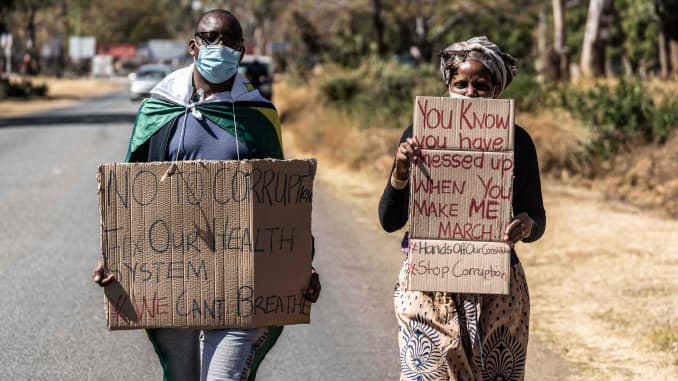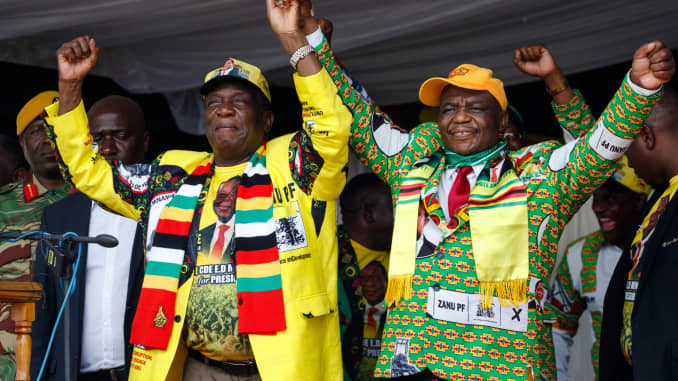Facing high triple-digit inflation, a currency capitulation and corruption allegations, Zimbabwe has become fertile ground for civil unrest.
Source: Zimbabwe divisions expected to deepen as activists decry ‘rampant abuses’ – CNBC
- Following a planned mass demonstration against President Emmerson Mnangagwa’s government on July 31, at least 60 people were arrested, according to Zimbabwe Lawyers for Human Rights (ZLHR).
- Human Rights Watch last week called on the Southern African Development Community (SADC) and the African Union to publicly speak out against what it called “repression and rampant abuses throughout the country.”

Facing high triple-digit inflation, a currency capitulation and corruption allegations, Zimbabwe has become fertile ground for civil unrest.
A government crackdown on peaceful protesters and the arrests of several high profile opposition figures, activists, journalists and writers over recent weeks has dragged Zimbabwe into the global spotlight once again.
These included novelist Tsitsi Dangarembga and the opposition MDC Alliance spokesperson Fadzayi Mahere. The arrests followed the controversial detention of investigative journalist Hopewell Chin’ono and Jacob Ngarivhume, leader of the political group Transform Zimbabwe, both of whom have been denied bail and are being held in government custody. In a recent interview with the Financial Times, Dangarembga warned that Zimbabwe will “implode” unless its citizens are able to have their voices heard.
Human Rights Watch last week called on the Southern African Development Community (SADC) and the African Union to publicly speak out against what it called “repression and rampant abuses throughout the country.”
The crackdown on activists has inspired an online campaign driven by the Twitter hashtag #ZimbabweanLivesMatter.
Mnangagwa and his government was not immediately available for comment when contacted by CNBC. However, in a speech last Tuesday, the president struck a defiant tone, vowing to weed out “bad apples that have attempted to divide our people and to weaken our systems.”
“Despite the hurdles we face – cyclones, droughts, sanctions & now the Coronavirus – our goal remains constant: To reform, restructure & rebuild in order to improve the lives of our people,” Mnangagwa said in a recent tweet, adding that the government would continue to “strive for peace, unity and progress.”
The coronavirus impact
The tensions come as Zimbabwe navigates both a crumbling economy and the impact of the coronavirus pandemic.
The country’s Vice President Constantino Chiwenga was last week appointed health minister after his predecessor, Obadiah Moyo, was sacked following corruption allegations concerning his role in awarding a $20 million contract for Covid-19 testing kits. He was arrested and is now awaiting trial.
However, Chiwenga has also found himself at odds with the president, Bloomberg reported, with Mnangagwa reportedly suspecting his deputy and other members of the ruling Zanu-PF of supporting the July 31 protests.
So far, Zimbabwe has recorded 4,748 coronavirus cases and 104 deaths, according to Johns Hopkins University data, though these totals are widely thought to be underestimated due to a lack of testing.
On thin economic ice
At the root of much of the unrest is the country’s economic turmoil, beset by tumbling GDP (gross domestic product), a return to hyperinflation and a rapidly depreciating currency.
The International Monetary Fund estimates that the economy will contract as much as 7.4% this year, following an 8.3% contraction in 2019. Although inflation slowed in June for the first time in five months, it still came in at 737.3%, compared to 785.6% in May.
Zimbabwe has changed its currency multiple times since 2000. The Zimbabwean dollar “quasi-currency” was reintroduced in 2019 but has depreciated by more than 300% since then. According to data from the central bank, the official local currency was hovering above ZWD 79 to the dollar on Friday, but the greenback has been changing hands at around ZWD 100 on some black market exchanges in recent weeks.
Plummeting real incomes for Zimbabweans and a scarcity of basic goods are further symptoms of the economic challenges faced by the population of almost 15 million people.
Politically threatened?
A recent report from risk consultancy Verisk Maplecroft placed the Zimbabwean government among the three most politically threatened on the continent, alongside Ethiopia and DR Congo. Verisk analysts attributed this to the “intersection between poor economic growth, low recovery capacity from COVID19, existing political instability and civil unrest.”
“Despite these challenges we do not expect worst case scenarios of government collapse or societal upheaval,” Verisk Maplecroft Head of Africa Indigo Ellis and her team said in the report.

Instead, they expect a continuation of existing political directions, with escalating repression deployed to counter deepening divisions and seize control of political space.
“Protracted disturbances will galvanize the military and strengthen the hand of the former officers who installed Mnangagwa in a 2017 coup,” the report predicted.
“This will widen divisions in the ZANU-PF politburo and cabinet, disrupting policymaking, albeit without threatening the regime.”
Verisk Maplecroft expects the tension between Mnangagwa and Chiwenga to continue through 2020, with the president seeking to amend the 2013 constitution to block the introduction of presidential running mates ahead of the 2023 election, thereby denying Chiwenga a place on the Zanu-PF ticket.
COMMENTS